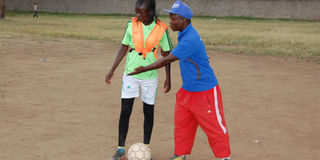Nakuru West Queens shaping lives through football

Nakuru West Queens head coach Mark Limisi (right) gives instructions to a player during a training session at Shabab grounds, Nakuru on December 7, 2018. PHOTO | FRANCIS MUREITHI |
What you need to know:
- The team participates in major football tournaments and the country's second tier
- Captain Mary Njeri says the girls are committed to do well but challenges such as lack of finances derail them
- And the man who is making it happen is the illustrious youthful coach Mark Limisi
Sandwiched between one of Nakuru’s oldest entertainment joint - Club Pivot - and the noisy, congested Jua Kali sheds, Shabab open grounds is almost invisible.
For a first time visitor in the area, it is hard to notice its presence thanks to the dirty open food kiosks that shield the perimeter wall.
But behind these open eateries, Shabab grounds is changing the lives of young and budding women footballers from social misfits and drug addicts into football stars.
“When I started I faced objections from parents who were reluctant to entrust me with their daughters,” says Benard Okwoku Esitoko who is the founder of Nakuru West Queens Football Club.
“The first few months I would have to go hunting for them door to door but it was not easy to convince the parents to release their girl child, but I persisted and I finally won their trust,” he told Nation Sport.
Today, the club which he started a decade ago with only eight players has 50 players and is one of the most formidable women football teams in the cosmopolitan county.
It accommodates girls between the ages of 16 and 22.
The team participates in major football tournaments and the country's second tier. They are winning the hearts of residents with their determination and compassion on and off the pitch.

Benard Okwoku Esitoko, the founder of Nakuru West Queens, during the interview with Nation Sport at Shabab grounds, Nakuru on December 7, 2018. PHOTO | FRANCIS MUREITHI | NATION MEDIA GROUP
One of its top strikers Stellah Anyango and defender Zipporah Magige are in the Harambee Starlets Under-20 side.
“I thank the club founder Esitoko as he showed me I had hope through football. He showed me the way,” says Anyango who is the club top scorer with 30 goals to her credit.
Anyango who is a great admirer of South Africa national women football team, Banyana Banyana, aspires to play professional football in future.
Captain Mary Njeri says the girls are committed to do well but challenges such as lack of finances derail them.
“Our target is to compete in the Women Premier League and we appeal to well-wishers to help us realise our dream,” said Njeri who is a utility player.
“Anytime I get a new player, I know her life will be made better as she will have less time to idle in the estate because Shabab is a tough neighbourhood for girls as teenage pregnancies and drug abuse is on the increase,” says Esitoko.
“We come together as a team and through this unity of purpose, the girls have learnt multiple life lessons like punctuality, the joy of winning, accepting defeat gracefully, patience and the will to fight,” he added.
Esitoko says the players have translated these life skills into their personal lives at home and this has won over parents who initially were against his idea.
“I want these girls to excel in life, not languish in the abject poverty that they have been thrown into by fate,” says Esitoko.

Nakuru West Queens players been taken through their paces by coach Mark Limisi at Shabab grounds, Nakuru on December 7, 2018. PHOTO | FRANCIS MUREITHI | NATION MEDIA GROUP
However, it was not a walk in the park in the beginning.
“Not that it is any easier now, but at least my joy is that the parents who thought I was wasting their daughters time wooing them to play football are my biggest supporters,” points out Esitoko.
He says lack of training gear such as boots, balls, uniforms, finances among others are a major challenge to the club.
And the man who is making it happen is the illustrious youthful coach Mark Limisi who takes charge of the training daily from 2.30pm to 5pm.
“Football is not only fun but empowering and good for the girls,” says Limisi who is behind the success of the team.
The formation of the club has helped coach Limisi spot talent from the densely populated estate.
“My message to parents in Shabab is, young girls who have finished school or are dropouts should not be used as house helps,” says Limisi.
“They can play football. They should not be hindered. It should be a choice.”
Club secretary Natarina Moraa concurs with coach Limisi.
“Football is a great tool to keep off girls from social evils and help them gain self-confidence. Some of them come from very poor backgrounds,” she explains.
The rest of the squad include Wilkista Juma, Josephine Imungu, Queentor Aoko, Peris Omuyumba, Esther Wanjiru, Fanis Kwamboka, Tabitha Wangare, Esther Andawa, Elizabeth Nduta and Diana Jemutai.
Others are Cecilia Njeri, Sharon Atieno, Esther Njambi, Carren Auma, Mercy Yavan, Naomi Wangui, Jane Wangechi and Fina Nyaboke.




